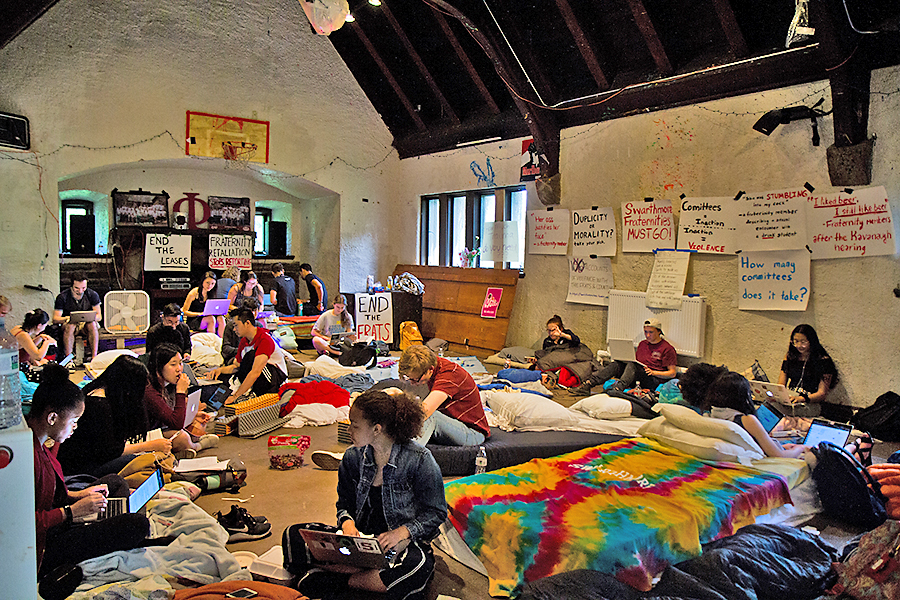In an unprecedented action, two Swarthmore College fraternities have announced they are disbanding in response to campus protests by women’s, LGBTQ and other student groups.
The action comes after documents from Phi Psi and Delta Upsilon were leaked to the campus newspaper, the Swarthmore Phoenix, and other media.
Racist, sexist and homophobic language and behavior, as well as hazing and pornography were detailed in those documents dating back from 2013-16. Another campus outlet, a protest group, Swarthmore Voices, said the documents were emailed anonymously and included photos showing members “kissing, groping and touching women.”
One of the leaked documents was the 117-page “Phi Psi Historical Archive,” which included numerous rape jokes, racist references, vulgar descriptions of sexual exploits and details of hazing. All of this was framed within the fraternity’s meeting minutes. Also in that archive were references to a “rape attic” and “rape tunnel” at Delta Upsilon.
The Voices story begins: “Content Warning: this article contains racist, sexist, ableist, homophobic, classist, and transphobic comments (including curse words and slurs).”
One account from the leaked documents describes the apparent sexual assault of a woman at a fraternity party who is passed out “face first.” In another reference, the writer describes a plan to “take over one building at a time until we possess enough building space to start our own “’MILF’ sex trafficking ring.”
One description shows a photo of the doorway of the campus Intercultural Center that has been urinated on, with a urinal placed in front of it.
Protests at the fraternity have been ongoing and have included a sit-in at the Phi Psi house.
Human rights groups at Swarthmore — a small, prestigious liberal arts college with about 2,000 students — lauded the May 1 closing of the fraternities.
On April 27, students protesting the revelations presented a list of demands to the Phi Psi fraternity, including that the house be closed and apologies be proffered to the targeted groups.
Protesters want the college to break the lease of the fraternity house and the house to be given over to marginalized groups historically targeted by fraternities with hazing and other abusive and violent rituals. Those groups included students of color, disabled students and LGBTQ students.
During the sit-in, women students hung a banner on the front of the Phi Psi house that read, “Still A Rape Haven.”
Swarthmore Voices issued a statement May 1 to acknowledge the fraternity closings.
“DU and Phi Psi have disbanded in a testament to the power of survivor-led student organizing and direct action. They made the right decision, even as the College refused to. Our work is not finished yet,” the group stated.
At 2:34 a.m. May 1, President Valerie Smith tweeted from the Twitter account of Swarthmore College, “Earlier tonight, we learned separately from both Phi Psi and Delta Upsilon fraternities that they each decided to disband and relinquish their houses. We respect these students’ decision to take this action.”
Smith attached a fuller statement on Swarthmore’s website.
Student protesters complained that Smith had not been sufficiently responsive to the Swarthmore community about the fraternity revelations.
Both fraternities posted statements on Facebook. Phi Psi’s statement reads, in part: “We the brothers of Phi Psi Fraternity seek to address the harm caused to the community,” and goes on to describe the document contents as “unacceptable” and “heinous.”
The post also noted that the current members of Phi Psi “were in high school and middle school” at the time of the writings and events depicted, but that, “we cannot in good conscience be members of an organization with such a painful history.”
“We hope that our decision will help the campus achieve transformative justice for those who have been harmed and promote institutional healing.”
Delta Upsilon posted that the dissolution of the fraternity “is in the best interest of the Swarthmore community.”
Smith had suspended the fraternities on April 27, pending an investigation to determine whether any current members were involved in the activities described in the leaked materials.
On the afternoon of May 1, Smith said she accepted both fraternities’ decision to disband and that at that time, there was “no evidence that any current student participated in the behaviors documented in those materials.”
